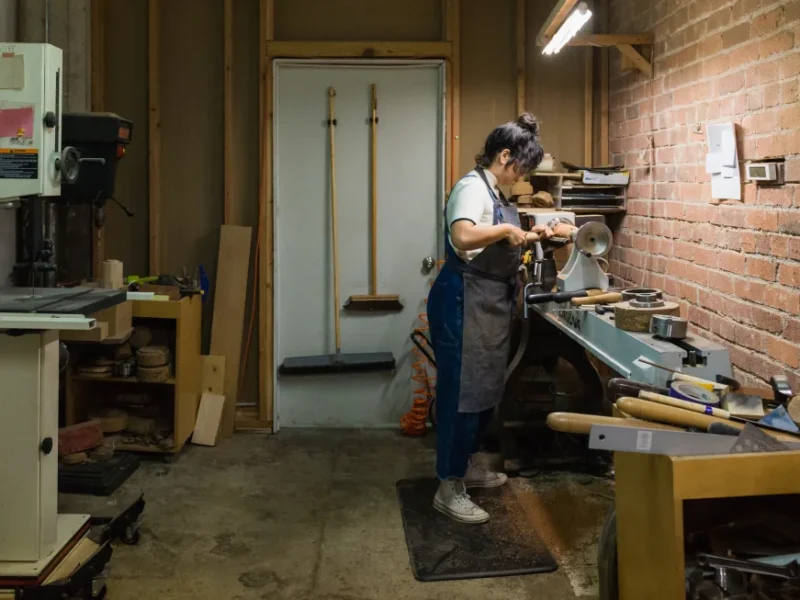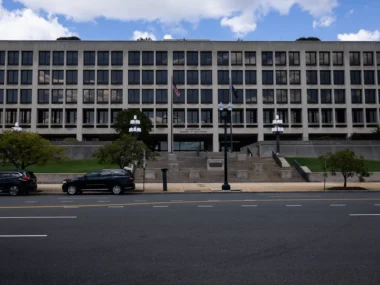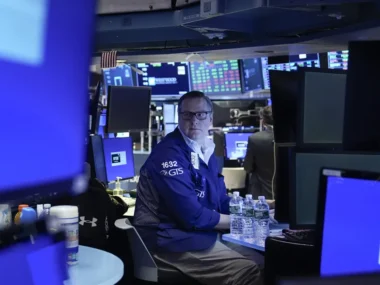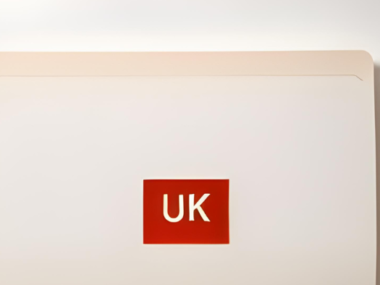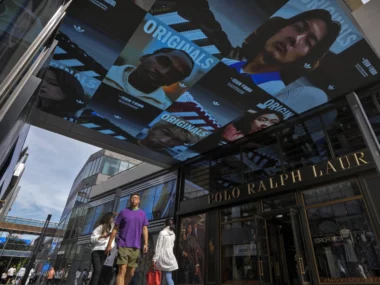Small businesses—key drivers of the U.S. economy and the kind of enterprises President Trump’s “America First” agenda claims to support—are now facing serious setbacks. Years of effort and growth for many entrepreneurs are unraveling rapidly.
Katharine Burke had just launched production for her Purryfuls self-care line in early April, the result of two years’ work. But that same week, steep new tariffs hit products imported from China—where her goods are manufactured.
Melanie Abrantes, over a decade into running her handcrafted goods brand, needs raw materials like cork and artisan tools from countries such as Japan and Portugal. But the shifting and unpredictable tariff landscape is causing unexpected cost surges for these supplies.
Beth Fynbo Benike, founder of Busy Baby, had high hopes for 2025. Her veteran-owned baby product brand had secured spots at Walmart and Target, and she placed a record order for inventory. Now, that shipment will cost her nearly $230,000 just to reach the U.S.
Trump’s unpredictable trade policies and harsh tariffs have thrown small businesses into disarray—driving up costs, disrupting supply chains, halting growth, and putting many American-made brands at risk.
“I’m fully maxed out financially,” Benike said. “My first thought was, ‘I could lose my home. My kids might not have a place to live.’”

Beth Fynbo Benike, founder of Busy Baby, stands in the Zumbrota, Minnesota warehouse where her baby products are stored, April.
These small businesses say they’re stuck in the middle of escalating trade conflicts. Despite their efforts to manufacture domestically, they’ve had to depend on imported goods because local sourcing and production aren’t feasible or, in some cases, available.
“I aimed for American manufacturing because I thought it would be easier to work with someone local, but it just doesn’t exist—it hasn’t for decades,” said Burke, who turned to a China-based manufacturer for her purring cat self-care plushies for adults.
“China has been investing in infrastructure, equipment, and workforce training for decades. That’s where the industry is, and that won’t change overnight, no matter how much you want it to.”
Early warning signs of danger.
Economists have cautioned that the sharpest increase in US tariffs in over 115 years could trigger a series of negative economic effects, such as higher costs, rising inflation, and lower earnings. This could lead to a reduction in spending, causing businesses to collapse, unemployment to rise, and potentially driving the US into a recession.
Small businesses, in particular, may serve as early indicators of the broader economic fallout.
Gus Faucher, chief economist at PNC Financial Services Group, told CNN that these businesses are most at risk from the tariffs.
Small businesses usually operate with tighter margins and cannot absorb the added costs like larger companies can. With limited access to capital, they are more vulnerable to external shocks.
“Walmart might be able to negotiate with its suppliers to avoid price hikes,” Faucher explained. “But small business owners don’t have that bargaining power.”
If small businesses begin to fail, it could significantly hinder the economy, Faucher warned.
Since small businesses with fewer than 50 employees employ nearly half of the American workforce and are key drivers of economic growth, their struggles could have a widespread impact.
“These businesses will reduce investments, which could exacerbate the economic slowdown caused by the tariffs,” he said. “This would weaken economic growth, increase unemployment, push inflation higher, and leave consumers worse off than before the tariffs.”
Challenges facing a newly established business
Burke has spent the last two years building her business and developing Purryfuls, a purring plushie designed to help stressed Millennials and Gen Zers.
The idea for the business stemmed from Burke’s own experience with stress while working in the high-pressure tech industry. On the verge of burnout, she sought comfort from her cat, Wren, but found that her 4-year-old Siamese tabby wasn’t always available for emotional support.
In response, she decided to create a self-care product inspired by Wren and debuted Purryfuls at the New York Toy Fair last month. After receiving positive feedback and securing numerous pre-orders, Burke moved forward with production.

Katharine Burke, founder and CEO of Purryfuls, at the New York Toy Fair in March.
The first batch of Purryfuls was being produced during the same week that Trump’s significant “Liberation Day” tariffs were introduced, causing duties on Chinese imports to soar to 145%.
“It started at 0%, then jumped to 20%, then 80%, 125%, and now 145%,” Burke explained. “As I watched the news, tariffs would pop up, be paused, and then come back. It’s really impossible for a business, especially a small one like mine, to keep up with that.”
Burke expressed concern that the tariffs could force her to shut down before her business even takes off. But she added that despite being the “smallest of small businesses,” she’s determined to keep fighting.
She has no choice but to press forward, hoping for the best, even though she’s uncertain how much more she’ll need to pay when her first 1,000 Purryfuls arrive at the Port of Los Angeles.
“I’m not ready to give up on something I’ve put two years into, especially when things could change in a matter of hours or days,” she said. “I’m hoping it changes soon, since that’s when the Purryfuls are set to arrive.”
“It’s so unpredictable. It shifts every day.”
When Trump announced a 90-day pause on the steep and fluctuating “reciprocal” tariffs for many U.S. trading partners (while maintaining a 10% across-the-board tariff), it provided a brief relief for Melanie Abrantes, an Oakland, California-based designer who imports carving tools from Japanese artisans and raw materials from countries like Portugal, known for its abundant cork.
“I’m half-Portuguese, so I wanted to connect with my heritage and use materials that tell my story,” she said.
However, the materials that distinguish Melanie Abrantes Designs could soon become even more expensive. “I’ve been trying to speed up as many orders as possible to get them through within that 90-day window,” she explained. “But there’s still a lingering sense of uncertainty.”
Costs are already rising for her business, as her U.S.-based packaging supplier, which sources some materials from China, has had to increase prices.
Although Abrantes hasn’t raised her own prices yet, she recently warned her customers on Instagram that she might have to pass on the added costs from the higher tariffs.
“It’s been so unpredictable; it changes every day, and it feels like I can’t keep up with it,” she told CNN. “It’s been tough to plan for this.”
“I want to invest in my business and my future, but it feels so uncertain, and it’s hard to make decisions when you’re not sure what’s going to happen.”
“As a small business, we don’t feel backed or supported.”
Everything seemed to be falling into place for Busy Baby, a company based in Oronoco, Minnesota, that specializes in preventing babies’ items from hitting the floor.
In the fall of 2024, the company secured deals with Target and Walmart to sell tethered baby placemats and other accessories in 250 stores nationwide.
As sales grew, and to supplement its online presence on platforms like Amazon, Busy Baby ordered a full container of products from its long-time manufacturer in China.
However, that $158,000 order, already paid for, is currently sitting in the manufacturer’s warehouse, 7,500 miles away. If it were shipped to the U.S., Busy Baby would have to pay an additional $229,100 due to the 145% tariff.
To cover this cost, Benike launched a crowdfunding campaign.
The challenges extend beyond the immediate future. The Walmart and Target deals were signed when tariffs were at 0%, and the terms locked in pricing.
Additionally, the container currently sitting in the warehouse is intended for summer inventory. Busy Baby’s next order is for the critical holiday season.
“I’m hesitant to begin production for the fourth quarter, which we would normally be doing right now,” she said. “About 40% of our annual sales come during that period, and we need to start production now to fulfill those orders.”
But given the current uncertainty, she said she’s exploring all options, including shifting sales to countries outside the U.S.
Benike is also reaching out to Congress to raise awareness of the difficulties faced by small businesses like hers, which, she feels, have been overlooked—especially as exemptions were made for products like smartphones and electronics, which benefit large tech firms.
“We don’t feel supported as small businesses by our government,” she said. “For me, as an Army veteran and small American business owner, I’m at risk of shutting down because the tariffs are so high that I can’t afford to bring my products into the country to sell them.”

